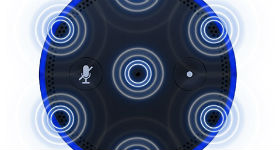Every year we look for what will be the true breakout product for the holiday season. With the latest reported numbers from Amazon, it looks like the Amazon Echo may be that product. You need two elements for a hit product: first, the product must be marketable enough to build demand, and second, you have to have strong enough supply and distribution to get it to enough folks while they still want it.
Strangely, enough even though the iPod was eventually a big success, it wasn’t as big a success as the Amazon Echo is this year initially.
The iPod Problem
When the iPod came to market it had a number of issues. First, it only worked on Apple computers and used a Fire Wire connection that was still pretty rare even for Apple. Second, there weren’t any Apple stores yet and, if we adjust for inflation, that little iPod would cost nearly $800 today. Folks weren’t quite ready to spend that much money for a product that basically just played music. Or so we thought.
Given all of that, Apple actually sold a lot of iPods, but what we don’t often talk about was how many returns came back in January. Yes, Apple did a really great job of building demand, but they mostly didn’t have Apple computers. The software to make them Windows-compatible didn’t show up until the following year, so a record number of iPods came back.
By version #3 the product worked on Windows well, the price came down a bit, Apple had far better distribution and the product went vertical. This time, it didn’t come back in large numbers the following year. Apple had a decent number of their own stores to showcase and sell the offering, and it remains one of the biggest successes in tech gadget history.
The iPod has given way to the iPhone now, but in its day it was a huge success it’s day. However, that success didn’t really come until year three.
The Amazon Echo
Amazon is a very different company. It didn’t come to retail late in its life; it was created as a retail entity. It is a retail store that scares everyone from Walmart, to Target, and Sears. So it is stronger by far in terms of distribution, particularly in an age where folks are increasingly buying on-line, than Apple ever will be. 
The Amazon Echo doesn’t even need a computer, but it is tied to Amazon’s services. That remains the product’s only major weakness because, when it comes to music, iTunes is still stronger. Still, Amazon Music can pull from your own music library, and now that Apple music doesn’t have DRM (the technology that made it so the music would only play on Apple devices) you can easily move your iTunes into Amazon’s service.
It is amazingly easy to install and, unlike the iPod’s initially limited interface, it works over Wi-Fi and wirelessly connects with a variety of home automation services. So you can plug it in and it will work almost immediately.
People are already used to Siri, so a similar product optimized for the home is natural to most consumers. And, unlike the iPod, this isn’t a one-to-one experience, but one you can more easily share with friends and family. So people saw the iPod being used by others, but people both see and hear the Echo when they come over to the house.
The one big similarity between the iPod and the Echo is both start out mostly focused on playing music and both did a really god job of that. Over the first 7 or 8 years for the iPod it evolved to do other things. In the weeks after the Echo was launched it has move to full home automation.
Wrapping Up:
It is interesting to note that the #2 product for Amazon this year is their new second generation Fire TV, largely because it both has the voice capabilities of Echo and it supports 4K TVs, which Apple TV does not. The only product that is arguably better is the NVIDIA Shield Android TV because it supports the new Netflix-like gaming service and, currently, Fire TV doesn’t. But, in the end, the Amazon Echo is this year’s iPod and it is a better initial offering than the iPod was. Kind of makes you wonder what it will evolve to do over the next 7 years, which brings up something else: unlike the iPod, which wasn’t designed to be updated initially, the Echo will take updates and is tied to cloud services which will be updated as well. So it will actually evolve in your living room.
One final thought: this is the only product since the iPad that my wife has truly loved. She seems to use it more than she uses her iPad now. There is no doubt in my mind that the Amazon Echo, at least this year, is the new iPod.
Edited by
Kyle Piscioniere